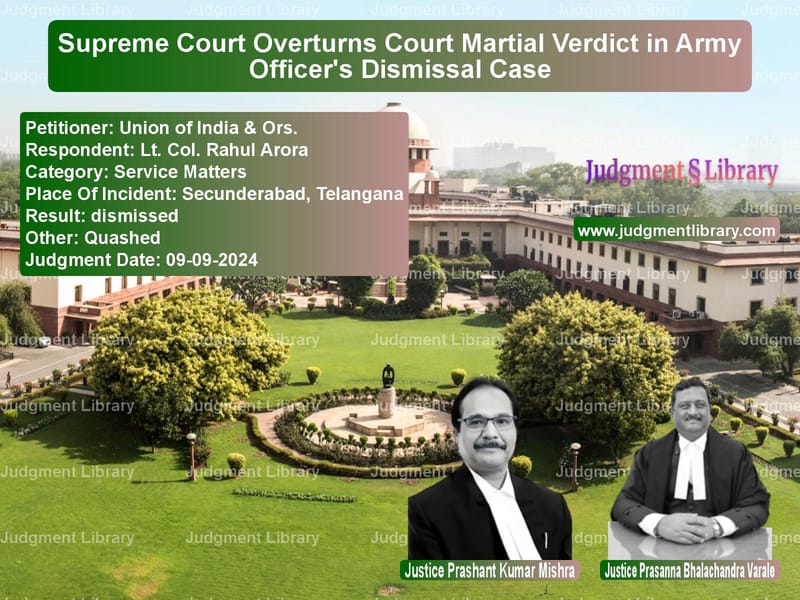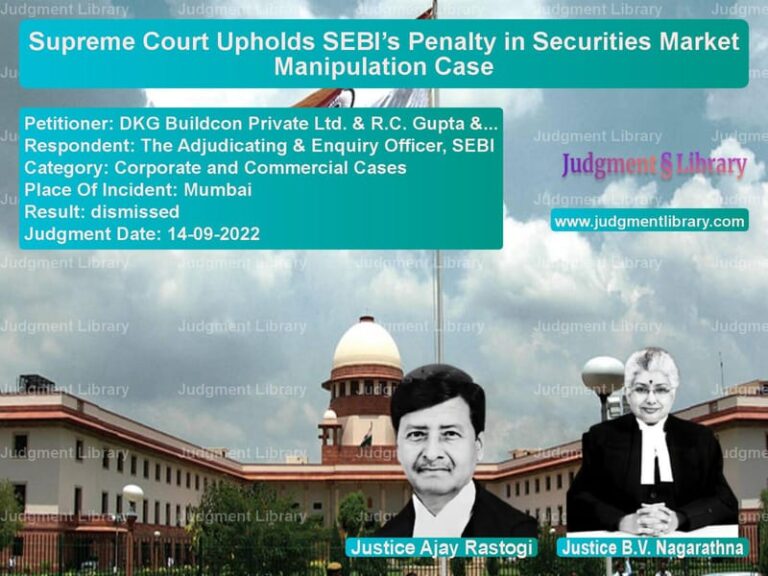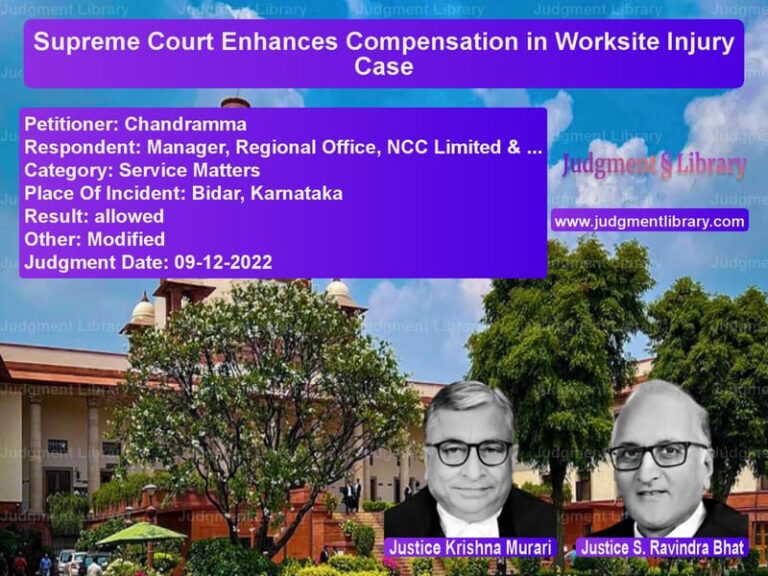Supreme Court Overturns Court Martial Verdict in Army Officer’s Dismissal Case
The Supreme Court of India has delivered a landmark judgment in the case of Union of India & Ors. v. Lt. Col. Rahul Arora, overturning the decision of the Armed Forces Tribunal (AFT) and a General Court Martial (GCM). The case involved allegations of misconduct and corruption against an army officer, leading to his dismissal from service. However, the Supreme Court ruled that the court martial proceedings were invalid due to procedural violations, particularly the appointment of a junior officer as the Judge Advocate.
Background of the Case
Lt. Col. Rahul Arora was commissioned into the Army Medical Corps (AMC) and later designated as an ENT specialist. In 2002, while posted at the Military Hospital, Secunderabad, he was responsible for examining new army recruits. During this period, a recruit, K. Siddaiah, alleged that the officer had altered his medical fitness status for extraneous considerations. This led to an internal investigation and subsequent court martial proceedings against him.
Charges Against the Officer
The following three charges were framed against Lt. Col. Rahul Arora:
- First Charge: Under Section 57(c) of the Army Act – Allegedly altering an official medical fitness document (AFMSF-7) with intent to defraud.
- Second Charge: Under Section 39(a) of the Army Act – Unauthorized absence from duty from April 11, 2004, to April 19, 2004.
- Third Charge: Under Section 45 of the Army Act – Conduct unbecoming of an officer.
The General Court Martial (GCM) found him guilty on two charges and dismissed him from service. His appeal before the Armed Forces Tribunal (AFT) was also dismissed, prompting him to challenge the decision in the High Court of Punjab and Haryana.
High Court’s Verdict
The High Court set aside the AFT’s order on a crucial technical ground – the appointment of a junior officer, Major Rajiv Dutta, as the Judge Advocate in the court martial proceedings. The court relied on the Supreme Court’s ruling in Union of India & Anr. v. Charanjit Singh Gill (2000), which held that:
“A Judge Advocate appointed with the Court Martial should not be an officer of a rank lower than that of the officer facing the trial unless the officer of such rank is not available and the opinion regarding non-availability is specifically recorded in the convening order.”
The High Court observed that the convening order originally supplied to the respondent did not mention the unavailability of a senior officer. A subsequent document containing this justification appeared to have been altered, leading the court to rule in favor of the respondent.
Union of India’s Appeal to the Supreme Court
The Union of India challenged the High Court’s order, arguing that:
- There is no absolute prohibition on appointing a junior officer as a Judge Advocate in a court martial.
- The convening order did contain an explanation for appointing a junior officer, which should be deemed valid.
- Army Rule 103 states that a court martial shall not be invalid merely due to an invalid appointment of a Judge Advocate.
Supreme Court’s Observations
Justice Prashant Kumar Mishra, delivering the judgment, made the following key observations:
“The reason for culling out exception as held permissible by this Court in Charanjit Singh Gill was not mentioned in the document while the same was dispatched by the issuing authority and supplied to the respondent. Subsequent mentioning of the reason in the other document, after putting signatures by the issuing authority, was unauthorized and impermissible.”
The court further emphasized:
“The law-makers and the rule-framers appear to have in mind the respect and dignity of the officer facing the trial till guilt is proved against him by not exposing him to the humiliation of being subjected to trial by officers of lower rank.”
Key Findings and Judgment
- The Supreme Court upheld the High Court’s decision and ruled that the appointment of a junior officer as the Judge Advocate rendered the court martial proceedings invalid.
- The court rejected the Union of India’s reliance on Army Rule 103, stating that protection under this rule is available only where a “fit person” has been appointed.
- The appeal was dismissed, and the officer’s dismissal from service was overturned.
Implications of the Judgment
The Supreme Court’s ruling reinforces the principle that military justice must adhere to due process and fairness. The key takeaways from this judgment include:
- Ensuring Fair Trials: The judgment highlights the importance of appointing a Judge Advocate of appropriate rank to maintain the integrity of court martial proceedings.
- Judicial Scrutiny in Military Cases: The ruling underscores that courts will not hesitate to intervene in military justice matters when procedural irregularities are evident.
- Protection of Officers’ Rights: The decision upholds the dignity and rights of officers facing trial, ensuring they are not subjected to unfair proceedings.
Conclusion
The Supreme Court’s verdict in Union of India & Ors. v. Lt. Col. Rahul Arora is a landmark decision that upholds the principles of procedural fairness in military trials. By striking down the flawed court martial proceedings, the judgment serves as a crucial precedent in safeguarding the rights of military personnel while ensuring that justice is served through a lawful and transparent process.
Petitioner Name: Union of India & Ors..Respondent Name: Lt. Col. Rahul Arora.Judgment By: Justice Prashant Kumar Mishra, Justice Prasanna Bhalachandra Varale.Place Of Incident: Secunderabad, Telangana.Judgment Date: 09-09-2024.
Don’t miss out on the full details! Download the complete judgment in PDF format below and gain valuable insights instantly!
Download Judgment: union-of-india-&-ors-vs-lt.-col.-rahul-arora-supreme-court-of-india-judgment-dated-09-09-2024.pdf
Directly Download Judgment: Directly download this Judgment
See all petitions in Disciplinary Proceedings
See all petitions in Termination Cases
See all petitions in Public Sector Employees
See all petitions in Judgment by Prashant Kumar Mishra
See all petitions in Judgment by Prasanna Bhalachandra Varale
See all petitions in dismissed
See all petitions in Quashed
See all petitions in supreme court of India judgments September 2024
See all petitions in 2024 judgments
See all posts in Service Matters Category
See all allowed petitions in Service Matters Category
See all Dismissed petitions in Service Matters Category
See all partially allowed petitions in Service Matters Category







